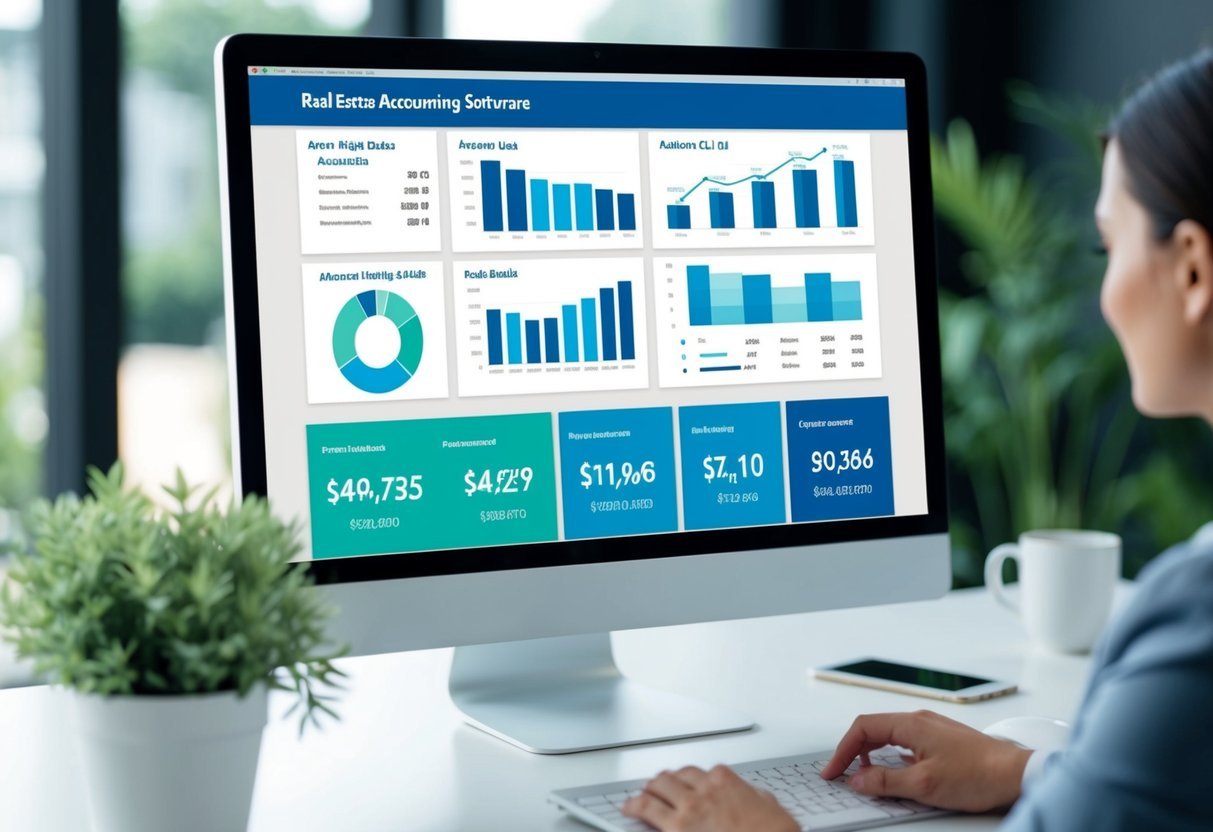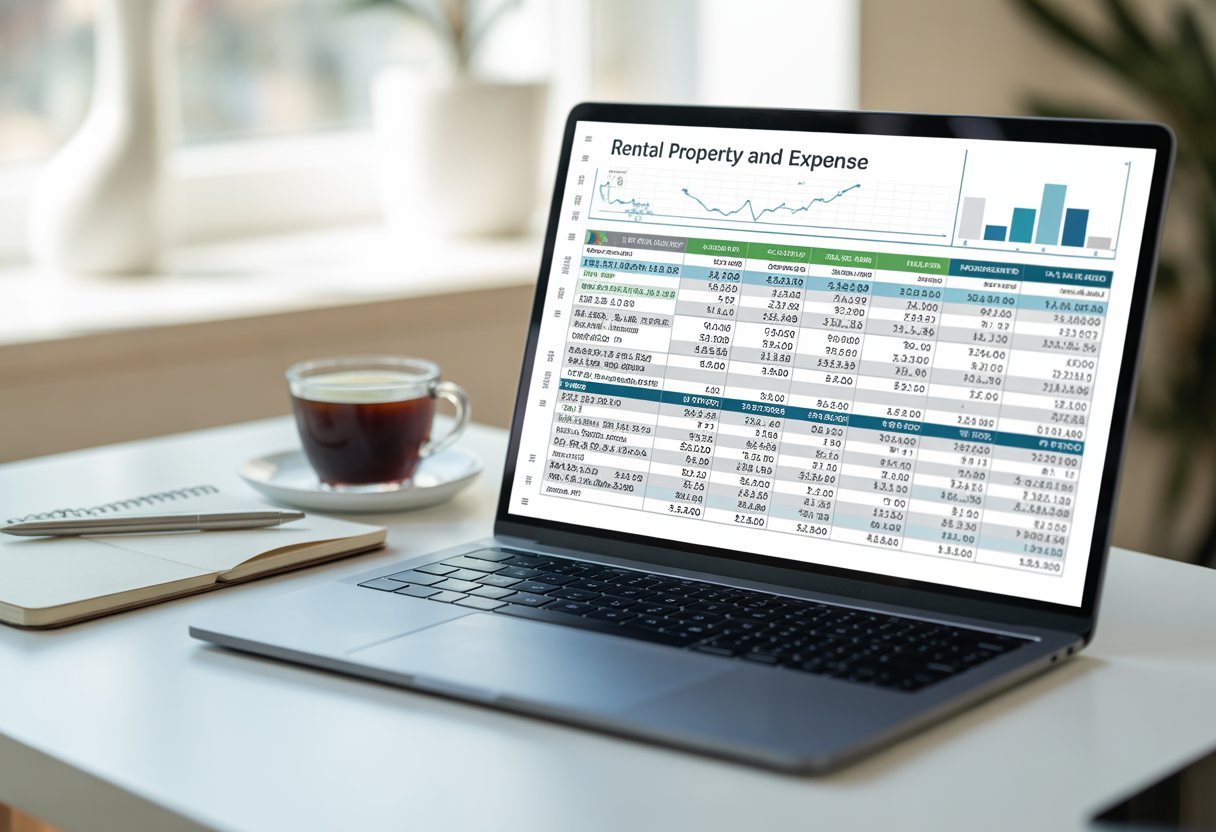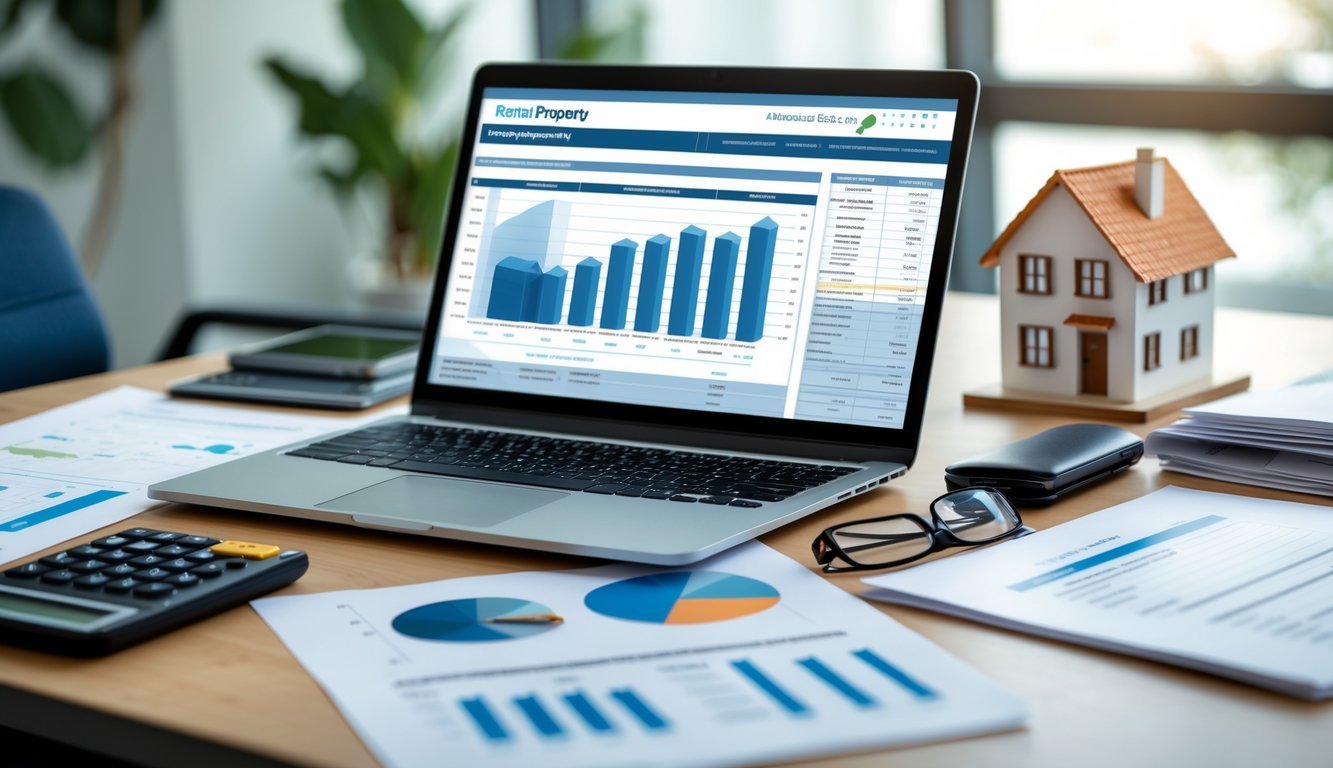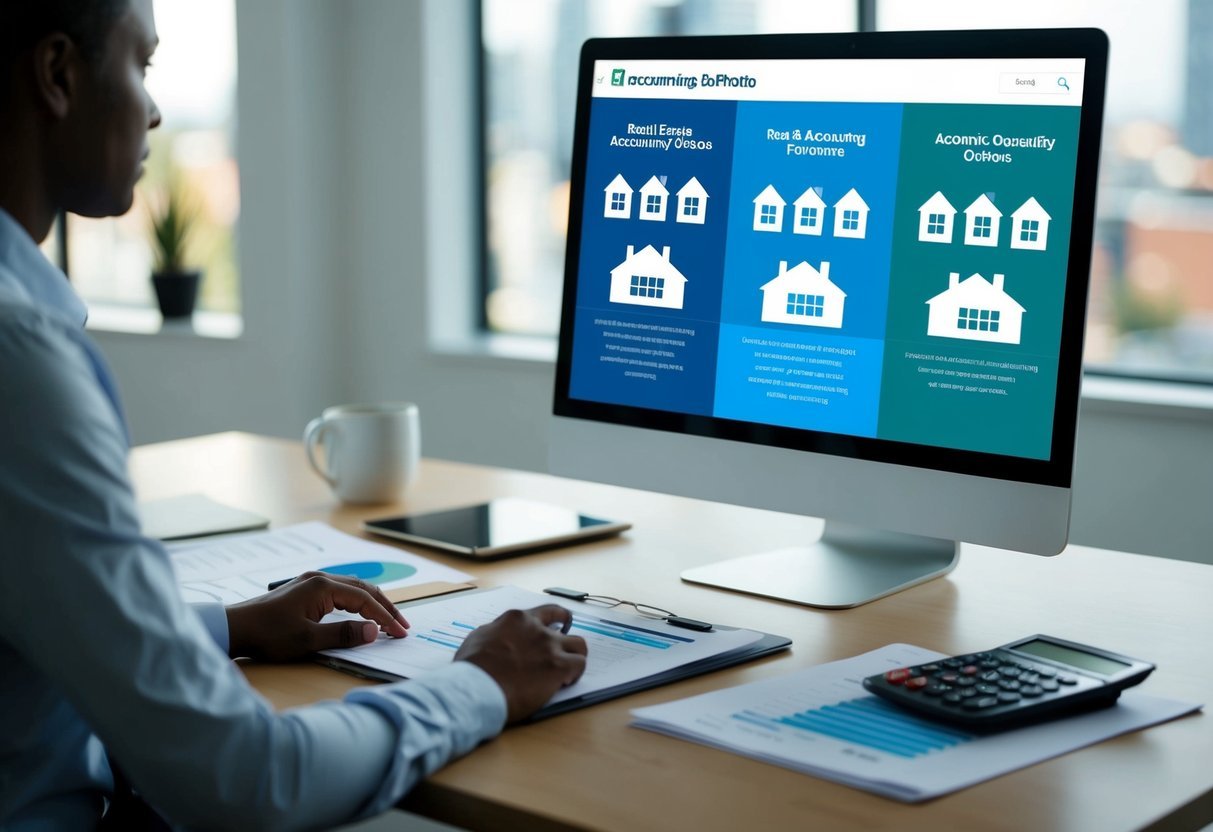Managing real estate finances demands specialized tools that go beyond basic spreadsheets. Real estate accounting software helps you track rental income, expenses, and tax obligations while maintaining organized financial records for your property portfolio.
You can streamline your property management operations with dedicated platforms that offer automated rent collection, expense tracking, and financial reporting tailored specifically for real estate investors. These solutions integrate seamlessly with your existing workflows, enabling you to make data-driven decisions about your investments.
Professional property management software provides essential features like income statements, cash flow reports, and tenant ledgers – all designed to give you clear visibility into your real estate business performance while ensuring tax compliance and accurate financial records.
Key Takeaways
- Modern accounting software automates complex real estate financial tasks while maintaining compliance
- Cloud-based solutions provide secure access to property financial data from anywhere
- Integration capabilities streamline workflows between property management software and accounting functions
Overview of Real Estate Accounting Software
Modern real estate accounting software streamlines financial management through specialized tools and automated processes designed for property-related transactions and reporting, helping you to avoid common mistakes.
Key Features
Real estate accounting platforms offer robust expense tracking capabilities that categorize property maintenance costs, utilities, and other operational expenses automatically.
Income management tools help you record and monitor rent payments, security deposits, and other revenue streams in real-time.
The software includes automated tax calculation features that organize deductions and prepare documentation for tax season.
Property-specific reporting tools generate financial statements, cash flow analyses, and occupancy reports tailored to real estate operations.
Benefits for Real Estate Businesses
Digital accounting solutions reduce manual data entry errors and save significant time through automation of recurring transactions and reconciliations.
You can access real-time financial insights through customizable dashboards showing property performance metrics and budget comparisons.
The software enables better decision-making with accurate forecasting tools and investment analysis capabilities.
Multi-user access allows your team members, accountants, and property managers to collaborate efficiently while maintaining appropriate security controls.
Cloud-based platforms ensure you can manage your finances from anywhere while maintaining data backups and security.
Comparing Top Real Estate Accounting Platforms
The right accounting software can transform your real estate business operations through automated bookkeeping, integrated property management, and streamlined financial reporting. Leading platforms offer distinct advantages in accessibility, features, and ease of use.
Cloud-Based vs. On-Premise Solutions
Cloud-based platforms like QuickBooks and Landlord Studio give you access to your financial data from any device with an internet connection.
These solutions automatically back up your data and provide real-time updates across all devices.
On-premise software requires local installation and typically needs manual updates. While it offers more control over your data, you’ll need to manage your own security and backups.
Cloud solutions generally cost less upfront but require ongoing subscription fees. On-premise systems often have higher initial costs but may prove more economical long-term for larger operations.
Integration Capabilities
Your accounting software should connect seamlessly with your existing business tools. Popular platforms integrate with:
- Property management systems
- Payment processors
- Banking institutions
- Tax preparation software
- Document management tools
Modern real estate accounting platforms support automated bank feeds and transaction categorization.
These integrations reduce manual data entry and minimize errors in your bookkeeping process.
User Interface and Usability
An intuitive interface saves time and reduces training needs for your team.
Look for software with:
- Clear navigation menus
- Customizable dashboards
- Drag-and-drop functionality
- Mobile responsiveness
Top-rated platforms feature visual reports and charts that make complex financial data easier to understand.
Simple data entry forms and automated recurring transactions help streamline daily accounting tasks.
Implementation Strategies

Successful deployment of real estate accounting software requires careful planning and systematic execution of key processes. Comprehensive implementation planning maximizes software effectiveness while minimizing disruption to existing operations.
Data Migration Considerations
Start by auditing your existing financial data and document storage systems to identify critical records that need migration. Create a detailed inventory of your chart of accounts, property records, tenant information, and transaction history.
Clean and standardize your data before migration to ensure accuracy. Remove duplicate entries, correct inconsistencies, and validate all financial records against source documents.
Proper data mapping between old and new systems is essential. Match fields correctly and test with a small data sample before full migration.
Training and Support
Identify key team members who will become system experts and can train others. These champions should receive advanced training first.
Create role-specific training materials that focus on daily tasks relevant to each user’s responsibilities. Include step-by-step guides and video tutorials for common processes.
Schedule hands-on training sessions in small groups to ensure individual attention. Practice with real scenarios your team encounters regularly.
Establish ongoing support channels through vendor resources, internal documentation, and designated super-users who can assist colleagues with questions.
Accounting Fundamentals in Real Estate
Managing financial transactions and maintaining accurate records forms the backbone of successful real estate operations. Real estate accounting requires meticulous attention to both income streams and expenditure tracking.
Revenue Management
Your real estate revenue tracking must include rent collections, security deposits, late fees, and property sale proceeds. Record each payment immediately upon receipt and categorize them properly in your accounting system.
Keep separate ledgers for each property to monitor individual performance metrics. This separation helps identify which properties generate the highest returns.
Document lease terms, payment schedules, and special arrangements in detail. Maintain clear records of security deposit holdings and ensure they remain in dedicated escrow accounts.
Expense Tracking and Management
Track every cost associated with your properties, including:
- Property maintenance and repairs
- Insurance premiums
- Property taxes
- Mortgage payments
- Utilities
- Marketing expenses
- Professional service fees
Create a monthly expense calendar to anticipate recurring costs. This planning helps maintain adequate cash flow for predictable expenses.
Keep detailed records of all maintenance receipts and contractor invoices. These documents support tax deductions and help analyze property operating costs.
Commercial real estate accounting requires you to separate capital improvements from regular maintenance expenses for proper tax treatment and asset valuation.
Financial Reporting and Compliance
Modern real estate accounting software transforms complex financial reporting and regulatory compliance into streamlined, automated processes that reduce errors and save time.
Automating Financial Statements
Real-time reporting capabilities enable you to generate accurate financial statements instantly, rather than spending hours manually compiling data.
Your financial statements maintain precision through automated transaction categorization and reconciliation features that eliminate manual data entry errors.
You can customize report templates to match your specific needs, whether you’re preparing statements for investors, lenders, or internal stakeholders.
The software automatically tracks important metrics like net operating income, cash flow, and occupancy rates, presenting them in clear, professional formats.
Adherence to Accounting Standards
Advanced compliance features ensure your financial records meet GAAP requirements and real estate industry standards.
Built-in audit trails document every transaction and modification, providing complete transparency for auditors and regulatory reviews.
You receive automatic updates when accounting standards change, keeping your reporting practices current without requiring manual intervention.
The software includes specialized tools for tax preparation, helping you maintain accurate records and generate required documentation for tax filings throughout the year.
Streamlining Workflows with Automation
Real estate workflow automation transforms manual accounting tasks into efficient digital processes, reducing errors and saving valuable time.
Automated Billing and Lease Management
Automated accounting solutions handle recurring rent payments, late fees, and utility billing without manual intervention. Your software can automatically generate and send invoices on preset dates, track payment status, and send reminder notifications to tenants.
Key Features:
- Automated rent collection and deposit tracking
- Digital lease document management
- Tenant payment portal integration
- Custom fee calculation and proration
The system flags payment discrepancies and maintains detailed transaction records for audit purposes. You can set up automated payment reconciliation to match bank deposits with tenant accounts.
Maintenance and Capital Improvement Tracking
Property management automation simplifies expense tracking for repairs and improvements. Your software can categorize maintenance costs, track contractor payments, and monitor project budgets in real-time.
Essential Tracking Elements:
- Work order management
- Vendor payment processing
- Budget vs. actual cost comparison
- Asset depreciation calculations
You can generate detailed maintenance reports to analyze property performance and plan future improvements. The system helps maintain accurate records for tax purposes and provides instant access to historical maintenance data.
Digital document storage ensures all receipts, contracts, and warranties remain organized and easily accessible.
Security and Data Protection

Modern real estate accounting software employs robust security measures to protect sensitive financial data and transaction records. Strong encryption and access controls form the foundation of secure real estate accounting systems.
Ensuring Data Security
Your financial data requires encrypted storage systems and secure transmission protocols to prevent unauthorized access and breaches.
Regular security updates and patches protect against emerging cyber threats and vulnerabilities.
SOC 2 and ISO:27001 certifications validate a software’s security standards and compliance with industry regulations.
Automated backup systems preserve your data integrity and enable quick recovery in case of system failures or data corruption.
Access Control and User Permissions
Role-based access control lets you assign specific permissions to different team members based on their responsibilities.
Multi-factor authentication adds an extra layer of security beyond traditional password protection.
Transaction management features allow you to track who accesses and modifies financial records.
Activity logs provide detailed audit trails of all system interactions, helping you monitor and investigate any suspicious activities.
User session timeouts and IP-based restrictions further strengthen your security posture by limiting unauthorized access attempts.
Cost Analysis and Optimization
Implementing the right accounting software directly impacts your bottom line through automated processes and reduced manual errors. Smart software selection combined with strategic implementation can cut operational costs by 20-30%.
Identifying Cost-Saving Opportunities
Real estate accounting software can automate time-consuming tasks like data entry, invoice processing, and report generation. This automation typically saves 15-20 hours per week for a medium-sized property management firm.
Track and analyze expenses more effectively by categorizing spending patterns and identifying areas of wasteful expenditure. Modern platforms offer AI-powered insights to detect duplicate payments and unnecessary service subscriptions.
Key areas for cost reduction:
- Automated bill payments to capture early payment discounts
- Digital document storage to eliminate physical storage costs
- Integrated bank feeds to reduce reconciliation time
- Automated tax preparation and compliance reporting
ROI on Software Investment
Property management software typically delivers ROI within 6-8 months through reduced labor costs and improved efficiency. Your investment analysis should consider both direct and indirect benefits.
Measurable returns include:
- 40-50% reduction in bookkeeping hours
- 90% decrease in payment processing errors
- 25% faster month-end closing
Factor in subscription costs against potential savings: A $200 monthly software subscription can offset a $2,000 monthly reduction in administrative expenses through automation and error prevention.
Consider scalability benefits – most platforms allow adding properties without proportional cost increases, creating economies of scale as your portfolio grows.
Future Trends in Real Estate Accounting Technology

Artificial intelligence and automation are transforming how you handle real estate accounting tasks. These technologies streamline transaction processing and reduce manual data entry errors.
Advanced digital tools now offer real-time financial reporting and analytics. You can access your property performance metrics and financial statements instantly from any device.
Cloud-based platforms are becoming the standard for real estate accounting. Your team can collaborate seamlessly while maintaining secure access to financial data from multiple locations.
Machine learning algorithms help you predict cash flow patterns and identify potential accounting discrepancies before they become problems. This predictive capability enhances your decision-making process.
Data-driven solutions are improving compliance monitoring. You’ll spend less time checking regulations and more time focusing on strategic financial planning.
Key emerging features include:
- Automated bank reconciliation
- Smart invoice processing
- Integrated property management tools
- Real-time tax calculation
- Multi-property portfolio tracking
Mobile accounting apps are gaining prominence. You can now approve transactions, review financial reports, and monitor property performance directly from your smartphone.
Frequently Asked Questions
Getting the right real estate accounting software requires evaluating specific features, costs, and capabilities that match your unique business needs. Accurate tracking of properties, tenants, income, and expenses demands purpose-built solutions designed for real estate operations.
What are the top-rated accounting software options for real estate businesses?
Real estate accounting platforms like Buildium, AppFolio, and Propertyware lead the market with comprehensive features designed for property management and real estate investing. These solutions provide integrated property management, accounting, and reporting capabilities.
Stessa and Rentec Direct offer strong mid-tier options with solid expense tracking and financial reporting tools. Their pricing typically ranges from $30-100 per month based on portfolio size.
Can you recommend accounting software tailored for small landlords?
REI Hub specializes in solutions for independent rental property owners managing 1-10 units. The platform focuses on simplified bookkeeping and tax preparation features.
TenantCloud and Landlord Studio provide affordable options under $25/month with basic accounting capabilities, rent collection, and maintenance tracking tools designed for small-scale operations.
What features should I look for in accounting software for real estate investing?
Essential features include property expense tracking and automated bank feeds to record transactions. Look for software that handles lease management and tenant portals.
The system should generate key reports like profit/loss statements, cash flow analysis, and tax documents specific to real estate investments.
How effective is QuickBooks for managing real estate accounting needs?
QuickBooks Online offers strong general accounting features that can be customized for real estate with proper setup of charts of accounts and classes.
The platform works well for basic bookkeeping but lacks specialized features like tenant screening, maintenance requests, and property-specific reporting found in dedicated real estate software.
Which software solutions are available for rental property accounting at no cost?
Basic versions of Landlordology and Stessa offer free plans with limited functionality for managing a small portfolio of properties.
Free spreadsheet templates from Google Sheets or Excel can work for simple rental accounting, though they require manual data entry and lack automation.
What accounting approaches are commonly adopted by real estate professionals?
Professional real estate businesses typically use accrual-based accounting to properly match income and expenses in each period.
Regular reconciliation of accounts, separation of operating and capital expenses, and proper classification of repair versus improvement costs form the foundation of effective real estate accounting practices.



